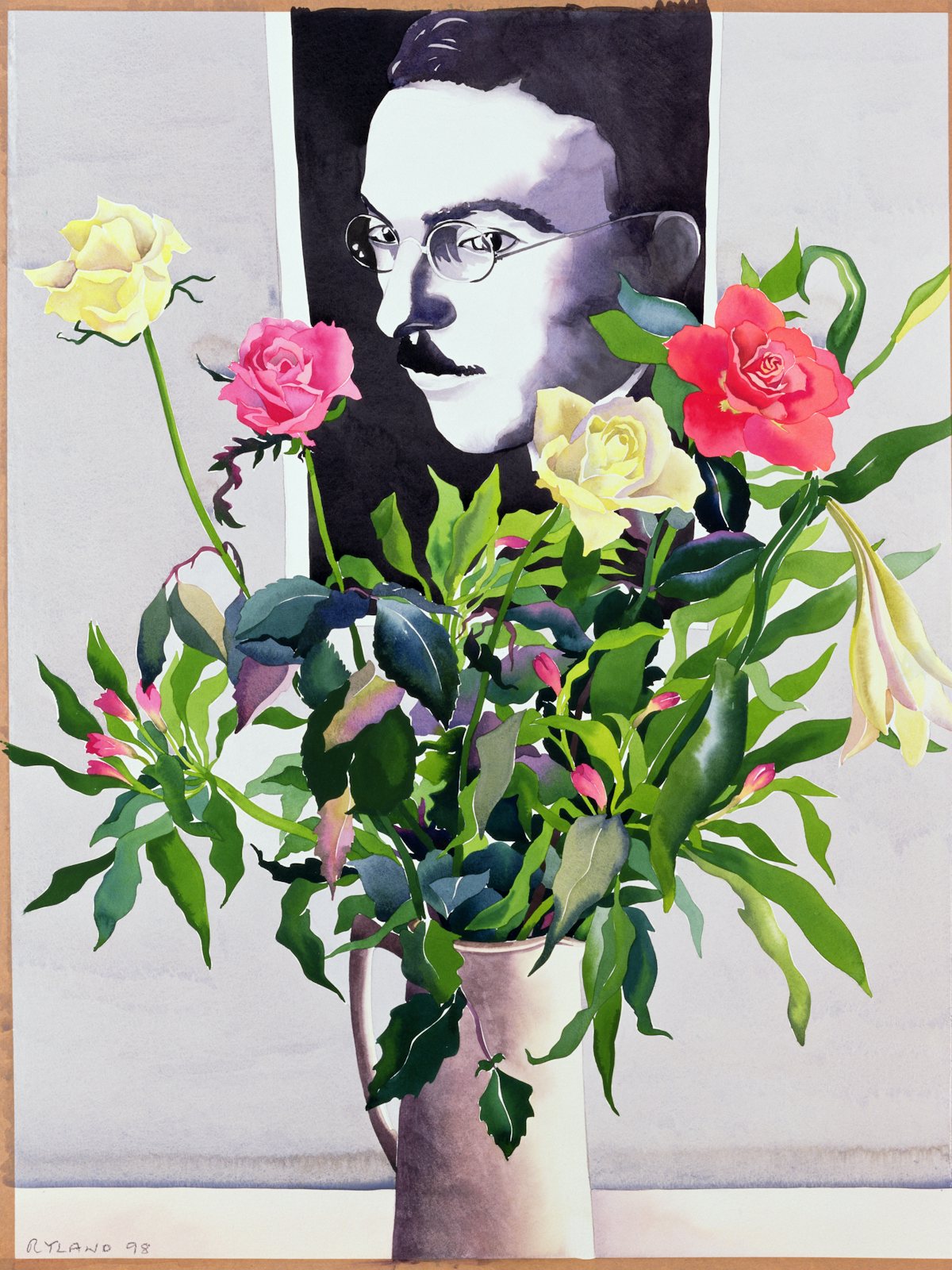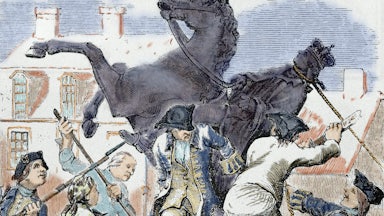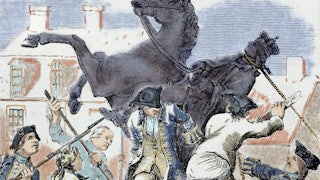Few of the poet Fernando Pessoa’s diaries survive, mostly businesslike lists of classes he attended or didn’t attend, people he met roaming the cafés of Lisbon, and daily activities. The most intriguing thing about these diaries is that they were generally written by someone else. For a few months shortly before he turned 18, Pessoa had a diary rubber-stamped on the top right corner of every page with its author’s name: “C. R. Anon.” Charles Robert was already the author, in English, of most of Pessoa’s teenage poetry. It seems that Pessoa felt his life was a novel, or else that his diary was the nonfictional record of an “Anon,” someone else who was living his life.

Pessoa had dozens of these alter egos, which he would eventually call “heteronyms.” He gave them birthdates and biographies, cast their horoscopes, practiced their signatures, and brought them along on dates to sabotage himself. The three most famous heteronyms were poets: zenlike sage Alberto Caeiro, who saw things as they truly are, absent of concepts (“What is a row of trees? There are just trees. / ‘Row’ and the plural ‘trees’ are names, not things”; “Remembrance is a betrayal of Nature, / Because yesterday’s Nature isn’t Nature”); Dionysian Álvaro de Campos, a kind of Walt Whitman on futurist steroids who fully lived out all urges and desires, his and other people’s, with numerous male and female lovers and fantasies of everything from worldwide travel to being raped by pirates; and Ricardo Reis, stoic and classicist, author of rational odes to restraint and renunciation. These three figures are widely considered three of the four greatest twentieth-century Portuguese poets, the fourth being Pessoa himself—or at least Pessoa under his own name: Pessoa “himself.”
Meanwhile, Pessoa also wrote the great work of modernist Portuguese prose, The Book of Disquiet, this time as “semi-heteronym” Bernardo Soares. Soares was Pessoa himself but only in part—the drab office-worker with the uneventful life; an indolent, anti-social skeptic, dubious about himself and the value of any possible striving. A collection of scraps and fragments arranged differently in every edition, The Book of Disquiet is autofiction of the anti-self, exploring the radical absence of unitary selfhood to the accompaniment of atmospheric arias of ennui, lush descriptions of Lisbon, and thrilling mental gymnastics usually recanted or renounced by the end of the entry. At one point, Pessoa/Soares calls “what’s truly I” a purely geometrical centerpoint: “the nothing around which everything spins, existing only so that it can spin, being a center only because every circle has one.”
Pessoa’s ambition—if not conscious ambition, then his dominant psychological drive—was to disappear, to not quite exist in the world. As we learn in the rich and illuminating new biography of Pessoa by his longtime translator Richard Zenith, to a remarkable extent he succeeded. He may not have managed to evaporate entirely, but he constantly scattered himself into new, more or less temporary identities. If every writer’s biography asks what about the subject’s life enabled his or her unique work, Pessoa’s biography has to grapple with an underlying question: How much does the real life, which Pessoa so consistently rejected, matter at all?
Fernando Pessoa’s childhood was filled with discontinuity and shifting identities. Born in Lisbon in 1888, he moved with his family to Durban, South Africa, after his father’s early death of tuberculosis and his mother’s quick remarriage to a dashing naval officer and diplomat in 1896. There—despite the Boer Wars, the active presence in town of a lawyer named Mohandas Gandhi, and Portugal’s continuing adventures and misadventures in its colonies—Pessoa absorbed practically nothing of African or multiracial realities. In his experience, Durban was the British Empire, more English than England. He went to English schools, worshipped and copied English writers, and would spend decades trying to succeed as an English-language poet.
The young Fernando was a creative and funny child. As Zenith uncovers for the first time, Pessoa’s uncle, Manuel Gualdino da Cunha, was a crucial influence on Pessoa’s imagination, exuberantly inventing stories for and with him—news of imaginary countries, wars in the Amazon between beetles and mosquitoes, fictional Portuguese consuls, and serial dramas of Fernando running for office as representative of an imaginary town.
At the same time, Pessoa had already developed the bookish, contemplative, observational habits that would characterize his adult life. Excessive maturity and immaturity can look a lot alike: Pessoa dreamed up fantasy cricket leagues and the characters or heteronyms who played in them; he produced a joke newspaper called The Tatler; he became one of the most accomplished students in his English-language school—despite starting at age 7 without knowing the language—graduating early and winning the Queen Victoria Memorial Prize for best English essay, beating the other 898 mostly older native speakers. Zenith rightly asks how much of this is impressively sophisticated, how much “astonishingly childish.” He quotes entertaining passages of Pessoa the angsty poseur (“I, being, animal, mammal, … megalomaniac, with touches of dipsomania, dégénéré supérieur, poet … pass sentence of excommunication on all priests and all sectarians of all religions in the world”), noting that Pessoa took the posing further than most: This document, from around Pessoa’s eighteenth birthday, was written by Charles Robert Anon. “Common things are disagreeable to me,” he wrote like every self-important teenager, though few carry this contrarian spirit quite so far into adulthood.
Pessoa returned to Lisbon temporarily from 1901 to 1902, which, as Zenith writes, “saved Fernando Pessoa for Portuguese letters [and] world poetry.” After acing his high school exams in 1905, he would have been eligible for a full scholarship to university in Great Britain, but he hadn’t been a student in South Africa for all of the previous four years, so he didn’t get the money and couldn’t go. Instead of becoming a critic, scholar, and probably subpar poet in English, he returned to Lisbon.
And there his life, or the absent center in place of a life, went on for 30 years until Pessoa’s death in 1935. Zenith fills in everything there is to know about it and the relatively few people who played important roles in it, most of whom turn out not to be real. They were mostly writers, but not all; some were mere identities, whose signatures Pessoa practiced over and over; some were Pickwickian male buddies, French aristocrats, or English lords; some were scams. While still a teenager, Pessoa entered newspaper puzzle contests under one pseudonym, “Tagus,” and then under another, “J.G. Henderson Carr,” who also submitted puzzles of his own; Tagus miraculously always managed to solve them and win the paper’s prize. “Dr. Faustino Antunes,” supposedly treating Fernando for a serious mental disorder, wrote to Pessoa’s former classmates, teachers, and friends of his parents, asking for information to illuminate his patient’s character, behavior, and possible “sexual excesses,” which is one way to find out what people think of you.
As a businessman too, Pessoa generated what we can only call fictions. He created, and proceeded to lose time and money through, a range of companies: one called Social Guarantee, “Agency of Indefinite Business Matters”; one called F.A. Pessoa, specializing in “commissions and consignments”; Cosmópolis, a “diversified commercial agency”; the Portuguese Cultural Guild, meant to “concentrate” and revitalize a Portuguese Empire of “cultural forces, financial forces and aristocratic forces” worldwide. One of his copywriting gigs was a brochure for high-luster car lacquer; what he turned in was so literary that it would posthumously be published in his Complete Stories. He started a film company and a correspondence college called Athena devoted to resurrecting Greek paganism in the modern world; he pitched board games he’d invented to English manufacturers.
When people are mentioned in the biography, it is almost surprising when they turn out to be actual friends or cousins. The real people in Pessoa’s life include his best friend and fellow writer Sá-Carneiro, who would commit suicide in Paris at 26, and his only romantic entanglement, a young secretary named Ophelia who fell for Pessoa in the office (he was 31, she 19), although to her great sadness the relationship never went beyond “minitrysts.” Many of these stories were known before, in sketchy versions, but Zenith gives us a full, and moving, sense of these people and Pessoa’s feelings for them.
He is especially thorough and even-handed on the issue of Pessoa’s sexuality and lack of sex life. The figure that emerges is not the vaguely asexual character Pessoa has long been thought to be, but quite clearly a gay man who never felt free to live out his desires, except in writing. Zenith is more nuanced than I can be here, and doesn’t come down on quite that conclusion (he calls Pessoa androgynously monosexual, with the heteronyms as his progeny), but the evidence is consistent throughout Pessoa’s life: the early tortured diary entries about feelings that must not be spoken or acted on; the urgent reflections on Oscar Wilde’s life and fate; the poems of gay love and gay lust, in adopted personas like everything else of Pessoa’s, culminating in “Antinous,” a long hymn of Emperor Hadrian mourning his dead lover, “O bare female male-body like / A god that dawns into humanity!”; Pessoa’s friendships with out gay poets and his championing of their work, from writing prefaces to publishing them in magazines. Zenith makes the case that one of Pessoa’s publishing schemes, which actually managed to put out five books before folding, was “the first gay imprint in Portugal, if not all Europe.” Pessoa’s “Antinous” took up most of one book, while two others were controversial works in the middle of censorship battles and fascist-populist crackdowns: Sodom Deified by “openly homosexual Raul Leal” and an extremely gay Songs by António Botto (Pessoa’s wild heteronym Álvaro de Campos admired their unapologetic “absolute immorality”). Pessoa’s essays and actions defending these writers and their work are the most heartfelt and direct activism of his life.
The most entertaining episode, which turns out to be surprisingly revealing, is the startling appearance in Lisbon of the English black magus Alastair Crowley and his latest young ritual-sex partner, who turn up and try to convince Pessoa to launch—and bankroll—a Portuguese chapter of Crowley’s cult. (Pessoa’s café acquaintances are astounded to see him chit-chatting with the smiling, beautiful blond; Crowley finds Pessoa’s friend Raul Leal too weird even for him.) Before slipping off to Berlin, Crowley leaves a fake suicide note with Pessoa, who not only tries to milk it for publicity but drafts a potboiler novel, The Mouth of Hell, about the events. No one in the world could be worse suited to spearhead a sex cult, but Zenith’s insight is right that Pessoa is like a shy, inside-out Crowley: not “Do What Thou Wilt,” Crowley’s motto, but “Say What Thou Wilt shall be the whole of the law.” After Crowley moves on to more Cabaret-era debauchery, Pessoa is left feeling more at peace about his celibacy and freer than ever to indulge in his occult investigations and spiritualist theories.
Accompanying Pessoa’s story, Zenith gives us the context of the “most politicized and turbulent period of modern Portuguese history”—an endless string of coups, assassinations, government collapses, and increasingly fascist takeovers—along with broad slices of everything else going on in the world. From the continuing misfortunes of the Portuguese empire to the rise of fascism across Europe, the march of history goes on as Pessoa frolics on the sidelines. Pessoa was a political writer and thinker, but mostly in the form of trying on this or that pose, no matter how extreme. He even planned to publish the fraudulent, antisemitic Protocols of the Elders of Zion in 1921, but here when Zenith offers the kind of implausible extenuating explanations biographers like to offer (“without any perceptible animus toward Jews,” “writing as a calm analyst who happened to be informed by reactionary ideas,” Pessoa was of Jewish descent himself), you feel that he’s right, Pessoa didn’t really mean it. Vaguely monarchist, racist, and pro-dictatorship for most of his life, Pessoa did change his tune toward the end, when real, existing fascism and, especially, censorship roused his libertarian instincts. He wrote savage satires of Portugal’s authoritarian prime minister, Salazar; said wittily but seriously of Hitler that “his very moustache is pathological”; and championed free-speech causes that got him into real trouble. Until then, everything except his defense of gay literature reads like just another experiment.
Which raises the question: What does any of this context matter? Zenith proposes that Pessoa “was very much a product of his time and geography,” but his book tends to show the opposite, and the move between story and context is sometimes quite a lurch. (Pessoa writes ad copy for Coca-Cola; the biography states, “While the American soft drink, with the help of Pessoa’s rhymed slogan, was quenching the thirst of curious Lisboners in the summer of 1927, a new conspiracy was under way to try to bring down the government.”) Zenith is consistently informed, witty, and attuned to surprising and satisfying connections—the perfectly equipped biographer—and Pessoa is as good as a biography of this type gets, which makes its limitations feel intrinsic to the genre. Zenith repeatedly acknowledges that “there was no essential self [Pessoa] would ever know” and thus “no secret Pessoa for the biographer to reveal.”
Pessoa himself admitted that “Fernando Pessoa doesn’t exist, strictly speaking,” although he admitted it playfully, through Álvaro de Campos. An uneasy tension remains between all the wonderfully marshaled facts and the ultimate unimportance of literal reality, which Pessoa so beautifully affirms.
The same goes for literary context. A self-dissolving drive was one strain of modernism, whether in the machine-fetishism of Italian futurism, Robinson Jeffers’s inhumanism, or pointillism and cubism and abstraction in painting; Zenith claims that Pessoa showed his countrymen “how to break with traditional forms of representation and with the notion of art as a faithful expression of a reliable ‘I’.” He often brings up comparisons—many of them illuminating, with Yeats or Cavafy or Eliot, and some more of a stretch (Joyce or Picasso). But at the same time, he shows how Pessoa “refused to identify with any group in a lasting way”: He didn’t belong to modernism because he didn’t belong anywhere.
Yes, he invented modernist movements—intersectionism, sensationism, swampism (!)—and wrote taxonomies and histories of these schools, usually under fake names, but his own poems drifted from one rubric to the next, none of his fellow writers ever produced work that really fit any of these -isms, and the “movements” evaporated quickly. “He was ultimately indifferent to all artistic recipes, fads, and formulas, including those of his own invention,” in Zenith’s words; they were just another scheme, another scene in the interpersonal drama Pessoa created for himself. Surely no major writer has ever written so many introductions, prospectuses, and tables of contents for unfinished or nonexistent projects; there’s Borges, but at least he published them as short stories, while Pessoa dashed them off and then, as Zenith nicely puts it, dropped them finished or unfinished “into his bottomless trunk, like a child dropping a coin into a deep well.”
We come away from Pessoa’s biography feeling that where he was from, where he lived, who he was, ultimately is much less important for him than for almost any other person. “What dumbfounds us, finally,” Zenith writes, “is Pessoa’s capacity to live so much of his mental and emotional life on an imagined, literary plane” and to “depersonalize” each of his qualities and impulses into different selves. “I’m the naked stage where various actors act out various plays,” he writes in The Book of Disquiet. Pessoa’s great creation, the heteronyms, were “a drama divided into people, instead of into acts,” he wrote in a 1928 autobiographical note. Zenith sets out to present a “cinematographic” life, the story of how Pessoa looked and lived from the outside, along with retracing an “imaginative” life, showing how he thought and felt from within. Most biographies try to bring the two together—biography exists to show how facts and environments influence an inner life. The glory of Pessoa is that he denies it.
It was a novelist who captured Pessoa best: José Saramago, writing historical fiction about someone else’s imagination. The Year of the Death of Ricardo Reis is Saramago’s novel about a heteronym’s return to Portugal from Brazil after Pessoa dies—Reis has conversations with the dead Pessoa, too, not with the ghost of Pessoa but dead Pessoa himself. This setup, along with cascades of unattributed dialogue and quicksilver narratorial intrusions, gives the book a kind of flickering reality that feels truly sublime, and somehow an epitome of what writing can be: multivoiced, from different perspectives at once, Pessoaesque.








